Kathryn Mockler's Blog, page 13
March 31, 2025
My grandfather was the type of man who would pretend he didn’t know you if you embarrassed him in public.
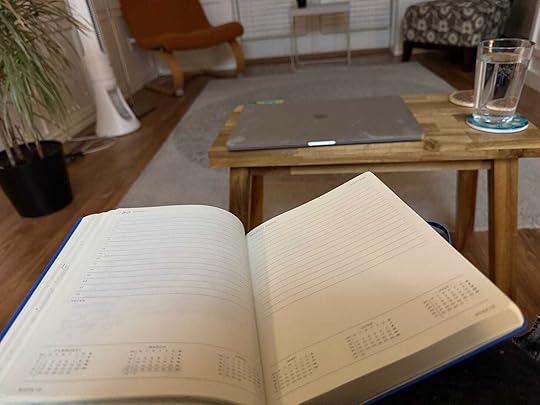
I bought this day timer thinking I would use it to organize my life, and instead it’s become a diary where I write one page about what I did in my day.
Without planning it, I start each entry with “Today I …”
I write very neutrally about the events of my day and only include the details and not much information about how I feel about things unless I’m having a particularly bad day.
I might write something like, “Today I saw a woman with thick black glasses standing on the sidewalk taking pictures of cherry blossoms while smoking a cigarette. Or I will repeat a headline: “A child in Gaza watched his mother burn alive. Then he died too.”
If I write a feeling, I might say, “Today I am depressed” or “Today I am scared.”
I’ve never been good at keeping a diary, but I guess this is what I’m doing.
I do it at the end of the day before bed.
My grandfather who wasn’t a particularly nice man kept a diary of the weather.
I used to think that was boring, but now I think it’s interesting, and I would like to see it, but I have no idea where his diaries ended up.
We could all write a diary of the weather, and it would sound different.
I wonder how he described each day of winter when it felt like winter would never end. I wonder how he described the rain and sunny days. Did he ever make notes about clouds or critters? Were there any mentions of trees?
My grandfather was the type of man who would beat his son with a rake for drinking underage or would pretend he didn’t know you if you embarrassed him in public.
Sometimes I skip a day writing in this diary, but I don’t let myself feel guilty about it.
Do you have a diary?
Share in the comments.
Featured campaign Rafaat Alareer Camp.
Donate to the Refaat Alareer Camp
Support Send My Love to AnyoneSupport Send My Love to Anyone by signing up for a monthly or yearly subscription, liking this post, or sharing it
Big heartfelt thanks to all of the subscribers and contributors who make this project possible!
ConnectBluesky | Instagram | Archive | Contributors | Subscribe | About SMLTA
My grandfather was the type of man who would beat his son with a rake for drinking underage or would pretend he didn’t know you if you embarrassed him in public.

I bought this day timer thinking I would use it to organize my life, and instead it’s become a diary where I write one page about what I did in my day.
Without planning it, I start each entry with “Today I …”
I write very neutrally about the events of my day and only include the details and not much information about how I feel about things unless I’m having a particularly bad day.
I might write something like, “Today I saw a woman with thick black glasses standing on the sidewalk taking pictures of cherry blossoms while smoking a cigarette. Or I will repeat a headline: “A child in Gaza watched his mother burn alive. Then he died too.”
If I write a feeling, I might say, “Today I am depressed” or “Today I am scared.”
I’ve never been good at keeping a diary, but I guess this is what I’m doing.
I do it at the end of the day before bed.
My grandfather who wasn’t a particularly nice man kept a diary of the weather.
I used to think that was boring, but now I think it’s interesting, and I would like to see it, but I have no idea where his diaries ended up.
We could all write a diary of the weather, and it would sound different.
I wonder how he described each day of winter when it felt like winter would never end. I wonder how he described the rain and sunny days. Did he ever make notes about clouds or critters? Were there any mentions of trees?
My grandfather was the type of man who would beat his son with a rake for drinking underage or would pretend he didn’t know you if you embarrassed him in public.
Sometimes I skip a day writing in this diary, but I don’t let myself feel guilty about it.
Donate to the Refaat Alareer Camp
Support Send My Love to AnyoneSupport Send My Love to Anyone by signing up for a monthly or yearly subscription, liking this post, or sharing it
Big heartfelt thanks to all of the subscribers and contributors who make this project possible!
ConnectBluesky | Instagram | Archive | Contributors | Subscribe | About SMLTA
Spill the T
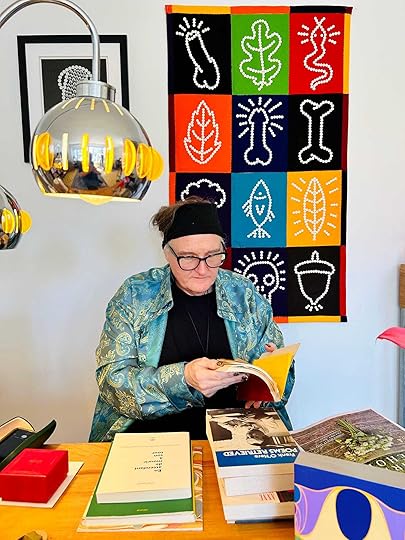 CAConrad. Photo: Kirby
CAConrad. Photo: KirbyOur beloved friend and "bride of Poetry," CAConrad is celebrating their 50th year wedded to the craft.
This is where/how it all began: some 15 years ago upstairs at the Imperial Pub attending a CA workshop that re-lit my pilot light after years of devastating loss during the AIDS crisis. It's where/when Hoa Nguyen and subsequently Dale Smith and I met, then I joined Hoa's Sunday afternoons reading & writing through Frank O'Hara.
Then, a few years later, we opened knife | fork | book.
I hadn't read a word by any of them prior to the workshop, but knew I wanted to write again, and hoped this might be a kick start. It was that and more, a clearing. Fresh air. Lifting pencil to poetry. Lifting myself.
CA is currently judging The 2025 Queer Poetry Prize at Palette Poetry, "Celebrating Queer Poetry in the New Age of Heterosexual Violence & Absolute Stupidity!" In a recent interview they were asked, "What are some of your favourite examples of queer poetry?" and right off the top they replied:
From the OG of the "I'm not taking any shit from anybody vibe," this is the highest of praise! Happy 50th sweet sis!
I recently received a card (in the mail!) from fellow poet Susan Wismer, with an essential quote from the great Jeanette Winterson:
"She must find a boat and sail in it. No guarantee of shore. Only a conviction that what she wanted could exist, if she dares to find it."
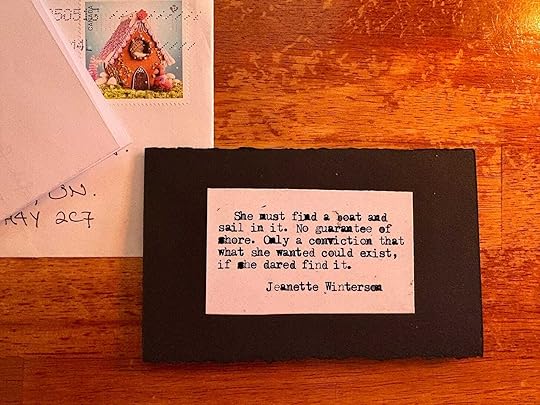 Handcrafted card gifted from poet Susan Wismer. Photo: Kirby
Handcrafted card gifted from poet Susan Wismer. Photo: Kirby...included inside, "one small note of kindness...to say thank you, thank you for your presence, your honesty, your truth — there's far too little of you in this world."
And this overwhelming letter (of recommendation) received "out of the blue" from poet, Luke Hathaway:
"As trans and nonbinary voices are silenced, erased from the record, and/or suppressed (daily tidings of this just now from the States), I think about wanting to lift up the voice of a transplanted queer American-Canadian who has spent a lifetime making space for queer and trans and gender-nonconforming voices: Kirby, of Toronto. As the force behind the beloved Kensington-Market all-poetry bookstore Knife Fork Books (est. 2016 and continuing in spirit — and as a small-press publishing house — beyond the demise of its KM location); as the author of my personal bible Poetry is Queer; as the director of Fertile Festival of New and Inventive Works; and in I suspect many other capacities, Kirby has invited all of us to lift up and celebrate our inner (or not so inner!) queerness, to enter into community with one another, to respect our differences, to celebrate our sexuality/ies and asexualities without shame. A liberatory voice and a force for good. We need Kirby now more than ever.
A personal anecdote:
When I transitioned, at the age of 41, in the midst of a literary career — and came out as a trans, queer & nonbinary man — Kirby was one of the first to embrace me, saying simply, ‘I’ve always got room in my heart for a new pocket of queerness.’ Bless them.
They are the queer parent I never had. They hold space not just for queerness but for poetry. They remind us that poetry is queer! — a liberatory space of language use which, for all our sakes, we must continue to make and to rejoice in."
I share this, not out of any self-aggrandisement, but because, I had no idea. We so rarely hear who we are to others. I responded to Luke saying as much:
"Isn't it funny, how we simply meet/read each other in kind relishing/drinking in the moment, only then to realize later—HOW EXTRAORDINARY—that it was/is possible at all these dark days.”
And Luke, what an honour and privilege to be Kirby in your life. as you are in mine.
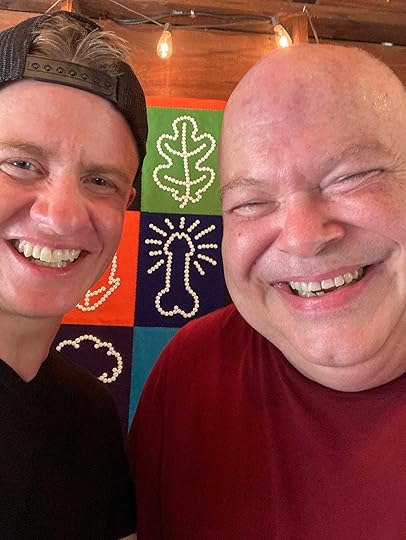 Luke Hathaway & Kirby. Fertile Festival of New & Inventive Works, 2022
Luke Hathaway & Kirby. Fertile Festival of New & Inventive Works, 2022To be. To be with each other. To lift each other up, hold each other dear.
This is who we are (or can be). Lifelines. Anchors. Wells to drink from. Where the language of poetry, poets nourish, sustain, revive, urge, nothing less than brilliant, our radiant [queer] selves.
To find any footing (at all) we didn’t realize we even had, often in the nick of time.
I would not be Kirby without CA, or Hoa, or Dale, or Susan, or Luke, Jim, or The Mockler, countless others you may never realize are connected to you through your writings, your presence, your being.
To list each of you whose faces are my immediate, the entirety of who I am.
Or as sister Sandra Bernhard knew all too well, Without You I'm Nothing
Today, happens to be International Transgender Day of Visibility. And, it's nice to have a day. Better still to walk down the street without fear or threat of violence.
Much is made of the "joy " in my work. That's my fairy, the one I (thank the homocats) never managed to kill. But know, my queen is pissed and on guard, at the ready.
The joy of being Kirby is I see you everyday.
Send My Love to Anyone is a reader-supported publication. To receive new posts and support this project, consider becoming a free or paid subscriber.
Support Send My Love to AnyoneSupport Send My Love to Anyone by signing up for a monthly or yearly subscription, liking this post, or sharing it
Big heartfelt thanks to all of the subscribers and contributors who make this project possible!
ConnectBluesky | Instagram | Archive | Contributors | Subscribe | About SMLTA
Join the weekly SMLTA Literary Amplifier so we can support each other’s notes, newsletters, publications, events, or literary activities.
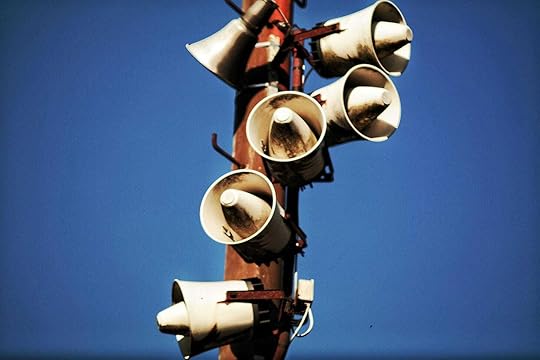 Photo by Jens Mahnke
Photo by Jens MahnkeJoin the weekly SMLTA Literary Amplifier so we can support each other’s notes, newsletters, publications, events, or literary activities.
The weekly Send My Love to Anyone Literary Amplifier will be posted on Mondays and open for a week.
It will be posted on the website and in the chat. It will not go out by email as I don’t flood inboxes.
Send My Love to Anyone is a reader-supported publication. To receive new posts and support this project, consider becoming a free or paid subscriber.
SMLTA Literary AmplifierI got the idea from Substack Writers at Work with Sarah Fay Notes Boost Challenge where she has been hosting a daily challenge for the past two months.
The SMLTA Liteary Amplifier will be focused on all things literary—from anecdotes and daily musings to literary events, writing tips, and newsletter publications.
I’m also trying to connect with small press and #CanLit authors.
Support other SMLTA writers by liking, sharing, or commenting.
Ensure that you actually are engaged with the work you are sharing.
This is not a tit for a tat but an opportunity to connect with literary people with whom you feel some connection.
New Note/Post or Old Note/Post - Doesn’t MatterThe note or post does not have to be a new one. For notes and Substack in general, the algorithm works differently on Substack than on other social media outlets.
Often notes will get traction weeks after they are posted.
We’ll start with four notes per week per writer!
GuidelinesWRITERS in the comments below, copy your note and a link to the note. You can find the note link by clicking on the three dots in the right hand corner of the note.
AMPLIFIERS please don’t engage with the note in the comments (that defeats the purpose), click the link and engage with the note itself.
If you post a note, be sure to like, comment, or reshare at least three other notes.
The idea is that we are helping the writer get their note some traction on the Notes app and by doing so you are also helping yourself get traction.
This will be particularly helpful for small or independent press literary writers who are drowning out here in Substackland!
Not sure what to post or share?Here are some ideas:
An old note that didn’t get traction
An excerpt from an older post
What you are reading
A funny anecdote
Writing advice you love
Writing advice you hate
A take down of some so-called writing rule
Remember to put the link in the comment so we can engage with it off this discussion.
March 30, 2025
What was your first literary publication?
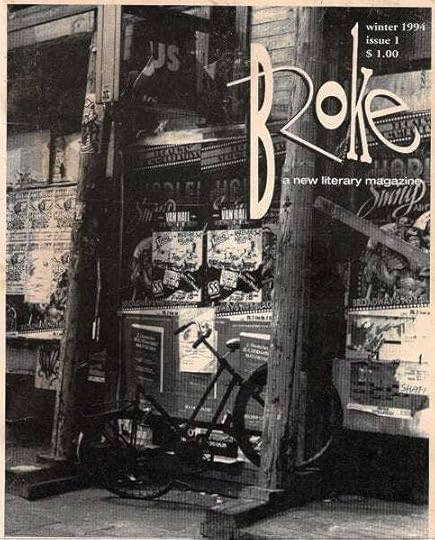
I remember when I got the phone call from Andrea Strudensky that Broke wanted to publish four of my poems in their first issue, I was over-the-moon excited.
Broke started in 1994 in “Darius Snieckus’ living room on St. Urbain street” (according to Facebook) by Andrea Strudensky.
I also lived on St. Urbain and was taking the call on a landline phone, twisting the green cord tightly around my fingers because I could not contain my excitement.
My poems were going to be in a magazine! A magazine that would be on newsstands…in Montreal anyway.
I couldn’t believe it. The magazine paid in copies, and I still have mine.
I had just finished my English and creative writing degree at Concordia and was eager to get some work published.
The year before I had a false start when I foolishly submitted to a $10 000 poetry contest in the back of a Harper’s magazine.
When I got the acceptance from the contest saying that my poem would be published, I jumped around my apartment and immediately called my sister to read her the letter—including the fine print, which stated that contributors had to purchase the $100 volume if they wanted their work published in the anthology.
As I considered how I could afford this (I could not afford it), my sister gently said, “Kathryn, I think it’s scam. I don’t think you’re supposed to pay for your writing to be published.”
Rereading the letter with tears in my eyes, I knew she was right.
Of course it was a scam.
I even recalled our poetry teacher telling us to be wary of poetry contests.
Once the fantasy of being published had dissipated, I took a good look at the photo of the leather-bound volume on the order form, and I could now see that the book was terribly cheesy with its gold lettering, decorative flower illustrations, and large-print format.
That disappointment made Broke’s acceptance all the sweeter.
Broke was the real thing because I knew who the editor was and where the magazine was published.
I’m not sure when the magazine stopped publishing, but in 2010 Broke created a Facebook group and shared some of the photos from past issues.
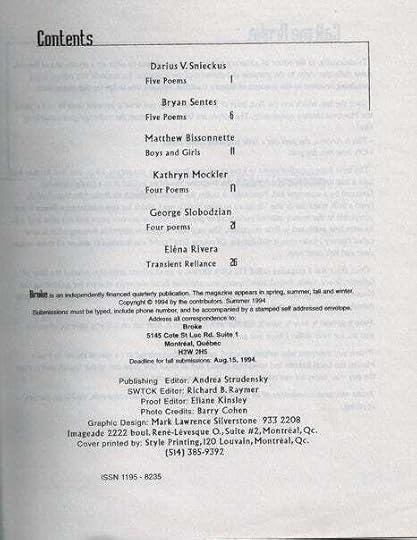
Although I hadn’t looked at the publication in years, I was delighted to see that I was in the same issues as filmmaker Matthew Bissonnette (Who Loves the Son, Passenger’s Side).
Small world.
Here’s one of my four poems that was published in Issue 1.
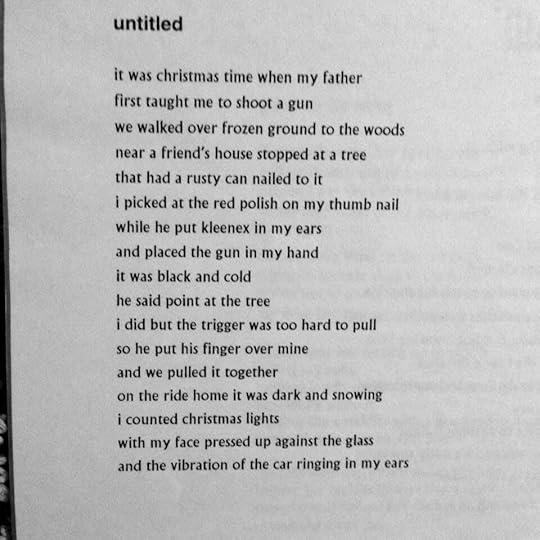 “untitled” by Kathryn Mockler, Broke, Issue 1, Winter 1994
“untitled” by Kathryn Mockler, Broke, Issue 1, Winter 1994This poem came from a childhood memory of my dad taking me out to shoot at tin cans on a friend’s land.
In fact, it’s one of my best memories of spending time with my dad although the poem seems somewhat depressing reading it now.
After my parents divorced, my father lost interest in my sister and I, so I guess the poem reflects how I felt about him at the time.
Things are somewhat better between us, but it hasn’t been an easy relationship. Unsurprisingly, it was one of the first things I wrote about as new writer.
What was your first literary publication experience?March 27, 2025
The 100-word Blast!
 Edward J. Woolsey | 1869100-Word Blasts
Edward J. Woolsey | 1869100-Word BlastsI have a couple of 100-word micro fictions forthcoming in SubTerrain’s next issue.
I had so much fun writing these, I thought I would share this prompt with you. I also did the prompt with my fiction class, and they got terrific results.
This is a constraint, but it has a lot of flexibility and freedom, which is why it is perfect for me.
Also I like to write micro.
So go at it—write a 100-words of something—a story, a poem, a dialogue.
Share your blast in the comments!
For InspirationExcerpts from The Teeth of the Comb by Osama Alomar
Sophie Calle’s work and book True Stories
Excerpt from 99 Stories of God by Joy Williams
Support Send My Love to AnyoneSupport Send My Love to Anyone by signing up for a monthly or yearly subscription, liking this post, or sharing it
Big heartfelt thanks to all of the subscribers and contributors who make this project possible!
ConnectBluesky | Instagram | Archive | Contributors | Subscribe | About SMLTA
March 26, 2025
Launching a book into the world is a mind fuck. It’s exciting but often devastating and can be humiliating.
 Photo by Dome Dussadeechettakul
Photo by Dome DussadeechettakulLow expectations and making the most out of everything big or small is the key to surviving.
Send My Love to Anyone is a reader-supported publication. To receive new posts and support this project, consider becoming a free or paid subscriber.
Book ToursFor my third post in My Adventures in Book Publicity series, I am focusing on book tours for small and independent press authors.
Literary festivals are often what makes up a great deal of a tour for an author and allows them to afford to go because festivals or your publisher pays for travel and hotel. Then the author can do side events around the festivals.
At the time that I had planned my tour, I had not been invited to any literary festivals, so I knew if I were to do a book tour I would be footing the bill.
Just because you have a book out doesn’t mean the world is waiting for it. That can be a tough pill to swallow for some writers, and book launch season can feel like one disappointment after the next, if you let it.
I’m not going to lie.
Launching a book into the world is a mind fuck.
It’s exciting but often devastating and can be humiliating. You may not be on a list or get a review or get an invitation. You will compare yourself and your book to others. You will mostly feel bad because it’s an exercise in exclusion.
Low expectations and making the most out of everything big or small is the key to surviving. I learned this lesson with my first book and have carried it with me through subsequent publications.
Nobody cares about your book more than you.
Nobody.
A book tour looks very different for a writer who is getting paying invitations along with some travel funding or for an author who can afford to self-fund and take time off for an extensive tour.
So if you don’t get invited to a paying festival, what can you do?
For most small or independent press authors, your press will likely host a group or small group launch. But that’s it. Understandably they won’t have the financial resources to send their authors on a major book tour or even pay for them to come to the launch. This is just the reality when you are with an independent press.
Through the Writer’s Union and the League of Canadian poets there is sometimes money for events and tours. I did not access these funds, but I recommend checking them out.
This puts literary authors without extra cash to fund a tour in an awkward position.
Should you organize your own tour and take on all the expenses when you likely won’t sell enough books to make it worth it?
There is no clear-cut answer for this. It really depends on your situation and what you are hoping to get out of the tour.
I will outline what I have done in the past with my poetry books, what I did with my debut short fiction collection Anecdotes, and what I would do in the future. Plus I will offer some alternatives to the in-person book tour.
What I Did for My Previous BooksFor my first book of poetry which was published in 2011, I did not do a tour. It didn’t occur to me to do one. With my nerves, I could hardly get through the two launches let along do a book tour.
Instead, I attended Tightrope’s group book launch in Toronto and then I hosted my own launch in London at the Forest City Gallery. I grew up in London and taught at the university at the time, so I wanted to have an event where my family and friends could attend. This was less about selling books and more about celebrating the book—although a hometown event like that, you do tend to sell books especially if it’s your first book.
For my second book, DC Books had arranged a group launch at the Blue Met festival in Montreal and then I organized my own launch in Toronto where I invited a couple of friends to read with me.
For my third poetry book, Mansfield Press arranged for a four-city bookstore tour—Toronto, London, Montreal, and Ottawa, but I covered all my own travel expenses which I did by putting it on my credit card. It was fun except I had terrible nerve pain in my neck, so the tour is a bit of blur.
While I hardly sold any books, I did make friends with the two other poets who I had met on the tour, and of course it was fun to read and hang out with my editor and publisher, so it made for a wonderful experience.
What I Did for AnecdotesI have to say that I’m not a huge lover of doing public events. I know some writers enjoy them. But takes a lot out of me, so the event has to be worth the excessive drain on my body and mind.
Before I decided to do a book tour for my debut short story collection Anecdotes, I had two readings lined up. I was invited to the Junction Reads Series online with in October 2023 and Susan Sandford Blades’ wonderful Wild Prose Reading Series in Victoria in January 2024.
I was initially not going to do a tour because I didn’t want to pay for it, and I didn’t want to be drained. In addition, I have health issues and still mask, and I thought that would also be a hassle. These two events plus a book launch seemed like enough.
When I say I like publicity—I like online publicity. You know—doing a newsletter, making videos and social media posts, and supporting other writers. I actually don’t like being in front of people in person.
Sad, maybe, but true.
And although I don’t like it, I do it anyway. I have had such anxiety around public performance that I’ve seen acting coaches and performance psychologists about it. I seem to be better these days, but I still find it exhausting.
However, my good friend wanted to do a book tour because his poetry book Queers Like Me was also coming out with Book*hug in the same season, and he has a terrific energy and attitude when it comes to celebrating good things and book publicity.
I reluctantly agreed threatening at times to pull out. Seriously how Michael put up with me I’ll never know! Anyway, once I finally committed, Book*hug helped us arrange events in bookstores in different cities.
Announce Your Tour DatesI wanted to keep the tour as inexpensive as possible since it was just going on my credit card (again), so I limited it to three cities that I could access by train—Toronto (at TRANZAC CLUB), Montreal (at Librairie l'Euguélionne), Ottawa (Perfect Books). Once I posted my tour dates—I got invited to Concordia’s Writers Read series and Words Festival in London (which were two paying events).
The strategy—post your tour dates and then say you’re looking for more events in and around those cities. While a series or festival might not be able to swing the whole trip for you, if they know you are coming to their region, they may add you to the ticket if you’re a cheaper date, which is what happened to me!
I’m a cheap date!
Tour with Other AuthorsI always recommend touring with other writers from your press or other writers launching in the same season. It’s hard to get people out to the launches especially if you’re the only one reading, and it’s way more fun to celebrate your book with others who are celebrating their books. Sandra Ridley joined us for the three-city tour and Hana Shafi launched with us in Montreal.
At the last minute, Micheal decided to come to Victoria, so the two of us actually kicked off our book launches in Victoria. It was difficult to find a bookstore that would have us at such a late date, but Camus Books—Victoria’s anarchist bookstore—welcomed us with open arms!
It seemed like a fitting way to start our tour!
All in all, the tour was very fun. I got to see friends I hadn’t seen in years, and it was a nice way to celebrate the book.
Again, I don’t think I made enough in sales to make it financially beneficial. I never go on vacation, so I sort of saw it as a mini vacation where I happened to make pit stops to read my book.
The other benefit to doing a tour is that you keep the publicity machine going by sharing your stops on social media. It gives you or your press a reason to keep posting about the book.
Take PicturesAs they say—do as I say and not as I do.
I was not good about taking pictures, so I don’t have a ton of documentation of the tour.
That was a mistake. Make sure you document each stop and at least get some group photos of the people you’ve read with.
Spread Out the Book TourAfter the wonderful Wild Prose event where I read with JD Derbyshire and Emi Sasagawa, I had a final launch for the book which my friend Kevin Chong sweetly set up in Vancouver at Upstart and Crow with Shashi Bhat and Christopher Evans. That was in February 2024.
This made me realize that my book tour didn’t necessarily have to happen all at once in a short amount of time. In fact, spreading it out can make you less exhausted and avoid having all your publicity in a short spurt that dies off.
What I Would Do Next TimeNext time, I would likely hire a publicist specifically to pitch me to festivals, reading series, and podcasts.
These are things I did not do myself but could have if I had endless time and energy which I did not.
Your press will do some of this, but it’s such a big job and having more people involved is a good thing. I would hire Hollay Ghadery from . I’ve been on the receiving end of her pitches for Send My Love to Anyone and she’s great. River Street tends to focus on small press authors.
My sense (and I have nothing to back this up) is that this might be cheaper than funding an entire book tour on your own. Even getting just one festival could help you create a tour using those travel funds for events in the region of that festival. But of course with hiring a publicist there is no guarantee, so it can be a bit of a risk.
Festivals and reading series are losing funding at such a rapid pace, I’m worried that there may even less space to present literary works in the future, so the more hands on deck the better.
The other thing I would do differently is intentionally spread out the tour over a year to a year and a half. This would allow me to recover from events because I do get so burnt out, but also I will not be able to take time off work.
For my Anecdotes tour, I was teaching online, so I didn’t have to miss any work. In the future, I will not be in this position so a tour would look quite different.
And really no one is paying any attention to you or when your book launches are taking place. You can extend your tour for as along as you want.
What Can You Do Instead of a Book Tour?What if you don’t want to or aren’t able to fund or take the time off or have another reason due to health or life circumstance for not wanting an in-person book tour?
While I enjoyed the book tour in the end, I’ve launched books both with a tour and without. It’s not the end of the world if you don’t do a book tour.
The key thing is that you want events in place so you can continue talking about your book. It’s about keeping the ball in the air for as long as possible.
Another harsh truth is that your press will be onto their next season’s books after about three months. So podcasts and other events online or in person can be great way to keep your book publicity going. Just because the press has to move on, doesn’t mean you have to.
Here are some ideas in addition to or in lieu of in person events or a book tour:
Online TourCreate an online event or tour for you to do a series of readings or interviews. Likely your press would help with this, and you can invite another writer to interview you or you can do a reading with other writers from your press or other writers who are launching in the same season as you.
There are still literary series and festivals that incorporate an online component—The Fold, Draft Literary Series, Junction Reads, and the Victoria International Authors Festival come to mind.
This does take some research, but you may be able to find some online opportunities.
In 2020 when we launched Watch Your Head: Writers and Artists Respond to the Climate Crisis (published by Coach House Press) co-edited by myself and 13 editors, we did a series of online events. More eyes were online at that point, but it is possible to do some cool online events.
Literary PodcastsPitch literary podcasts. Well before your book comes out, do some research into literary podcasts and pitch their hosts.
The great thing about this is that you can reach new audiences, and you don’t have to leave your house!
Literary podcasts tend to have a dedicated readership. I found out about literary podcasts too late into my promotion activities or else I would have pitched some.
Howwever, I ended up being invited to Tim Blackett’s (author of Grandview Drive) podcast Tim Blackett and Friends (I met Tim on Tik Tok!), Rebecca Davey and Natalie Davey’s (who I met on Substack) and Short Story Today with Jon DiSavino (who Hollay Ghadery put me in touch with).
All of these opportunities came from online networking and making friends with people who are into the same shit. I’ll go into more detail on this when I do my post on social media.
Promote to Book clubsI didn’t do this, but if you want to promote your book and not travel, you could try to promote to literary communities where you live such as library book clubs, bookstore clubs, continue education classes, and other community spaces.
Join the UnionsJoin the Writers Union, the Canadian Authors Association, and/or the League of Canadian Poets.
Often there are opportunities for new members to read in their regions. Also if you are a member of these unions then your book is eligible for various book awards.
Pitch Universities and Colleges in Your RegionIf you have a college or university in your area, why not send an email to the English or Writing Department and let them know about your book. Try and get in touch well before the fall semester starts, and an instructor might be able to bring you in as a guest speaker online or on Zoom.
Universities are cutting funding for guest speakers so there is often no money for travel and very small honorariums if any. If you’re looking for a place to read and talk about a book, you might consider letting the department know that you’re in town or plan to be in town and would love to visit a class in person or on Zoom.
It’s worth a shot. It might not be a paying gig if you’re doing the asking, but at least you’re not paying to play.
With limited paying opportunities and the defunding of series and festivals, small press and independent authors have to get creative with their publicity.
My advice is do what you can within the limits of your situation.
It can feel terrible and vulnerable waiting for people to notice you or your book, and it’s difficult to create opportunities for yourself when you’re feeling forgotten or overlooked, but if you’re able to do something, this can lead to other opportunities.
Remember you have a book. That is a huge accomplishment, and you want to make the most of it.
I’d love to hear about your book tour experience and other book tour publicity tips or ideas for small press and underfunded authors.My Adventures in Book Publicity Series
Kathryn Mockler is the author of the story collection Anecdotes (Book*hug Press, 2023), which won the 2024 Victoria Butler Book Prize and was a finalist for the 2024 Trillium Book Award, 2023 Danuta Gleed Literary Award, 2024 Fred Kerner Award, and 2024 VMI Besty Warland Between Genres Award. She co-edited the print anthology Watch Your Head: Writers and Artists Respond to the Climate Crisis (Coach House Books, 2020). Her films have screened at TIFF, EMFA, the Palm Springs Film Festival and most recently at the Arizona Underground Film Festival and REELPoetry/HoustonTX. She runs the literary newsletter Send My Love to Anyone and teaches screenwriting and fiction in the Writing Department at the University of Victoria.Featured Campaign - The Sameer ProjectEach edition of this book promotion for authors series will feature a campaign or organization close to my heart that I will donate to and hope you will join me.
The Refaat Alareer Camp - by The Sameer Project
The Sameer Project, a grassroots aid organization led by four Palestinians in the diaspora, is proud to announce our first tent encampment project that provides shelter and specialized support to displaced families in Central Gaza.
Donate to the Refaat Alareer Camp.
Support Send My Love to AnyoneSupport Send My Love to Anyone by signing up for a monthly or yearly subscription, liking this post, or sharing it
Big heartfelt thanks to all of the subscribers and contributors who make this project possible!
ConnectBluesky | Instagram | Archive | Contributors | Subscribe | About SMLTA
March 24, 2025
Speech Dries Here on the Tongue
I’m thrilled to have three poems included in this wonderful and important anthology on environmental collapse and mental health.
 Text within this block will maintain its original spacing when publishedSpeech Dries Here on the Tongue: Poetry on Environmental Collapse and Mental HealthEdited by Hollay Ghadery, Rasiqura Revulva, and Amanda ShanklandThe Porcupine's Quill, 2025
Text within this block will maintain its original spacing when publishedSpeech Dries Here on the Tongue: Poetry on Environmental Collapse and Mental HealthEdited by Hollay Ghadery, Rasiqura Revulva, and Amanda ShanklandThe Porcupine's Quill, 2025Order Speech Dries Here on the Tongue
Speech Dries Here on the Tongue is an anthology of poetry by Canadian authors exploring the relationship between environmental collapse and mental health. This threat of environmental collapse has brought with it a sense of impending annihilation and has contributed to the current mental health crisis, made crueller by a global pandemic that highlighted our fragile nature. These are poems by writers who have used their words to both articulate and navigate this crisis, unpacking the complex interplay between mental and environmental health in order to alert, inform, and inspire readers.
Edited by Hollay Ghadery, Rasiqra Revulva, and Amanda Shankland, the collection includes work by Brandon Wint, Jennifer Wenn, Canal Smiley, Amanda Shankland, Concetta Principe, Dominik Parisien, Khashayar Mohammadi, , Tara McGowan-Ross, , Grace Lau, Fiona Tinwei Lam, , gregor Y kennedy, Maryam Gowralli, , , Karen Houle, Nina Jane Drystek, AJ Dolman, Conyer Clayton, .
Support Send My Love to AnyoneSupport Send My Love to Anyone by signing up for a monthly or yearly subscription, liking this post, or sharing it!
Big heartfelt thanks to all of the subscribers and contributors who make this project possible!
ConnectBluesky | Instagram | Archive | Contributors | Subscribe | About SMLTA
Literary writers are drowning out here in Substackland
Join the weekly SMLTA Literary Notes Amplifier so we can support each other’s notes, newsletters, publications, events, or literary activities.
The weekly Send My Love to Anyone Literary Notes Amplifier will be posted on Mondays and open for a week.
Send My Love to Anyone is a reader-supported publication. To receive new posts and support this project, consider becoming a free or paid subscriber.
SMLTA Literary Notes AmplifierI got the idea from Notes Boost Challenge which she hosts every Friday and has been doing a daily challenge for the past two months.
I’m trying one for SMLTA subscribers focused on all things literary—from anecdotes and daily musings to literary events, writing tips, and newsletter publications.
Support other SMLTA writers by liking, sharing, or commenting.
Ensure that you actually are engaged with the work you are sharing. This is not a tit for a tat but an opportunity to connect with literary people with whom you feel some connection.
New Note or Old Note - Doesn’t MatterThe note does not have to be a new note. It can be an old note. Notes work differently on Substack than on other social media outlets.
Often notes will get traction weeks after they are posted.
While we’re getting started let’s keep it to three notes per week per writer!
GuidelinesWRITERS in the comments below, copy your note and a link to the note. You can find the note link by clicking on the three dots in the right hand corner of the note.
AMPLIFIERS please don’t engage with the note in the comments (that defeats the purpose), click the link and engage with the note itself.
If you post a note, be sure to like, comment, or reshare at least three other notes.
The idea is that we are helping the writer get their note some traction on the Notes app and by doing so you are also helping yourself get traction.
This will be particularly helpful for small or independent press literary writers who are drowning out here in Substackland!
Let’s try it!
March 22, 2025
Dale Martin Smith “Notes On Paradise”
Poet Peter Gizzi writes of The Size of Paradise:
“The momentum of this capacious book-length sequence keeps turning outward as it investigates an inward subjectivity, not all together Dale Smith per se, but maybe a collective interiority where we find, ‘Dead things collect in words.’ And more importantly we discover ‘There will be love as memory.”
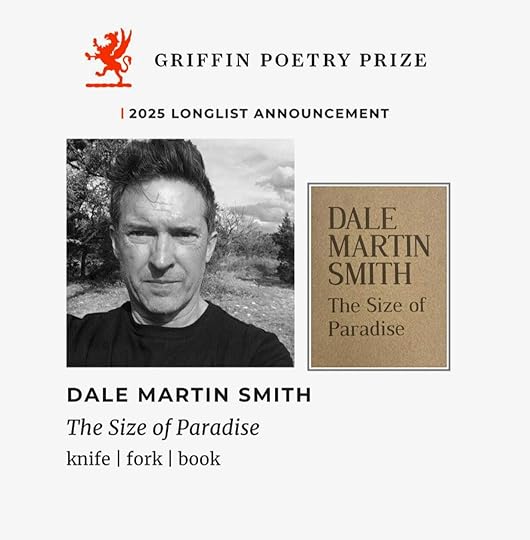 Dale Martin Smith “Notes On Paradise”
Dale Martin Smith “Notes On Paradise”An April 7, 2020, obituary for John Prine who died of Covid-19, reported that the songwriter loved telling stories about his work, but often with some reservation: “When I wrote this,” he said, “I stayed in my room for three days. I was afraid someone was going to ask me what the song was about.”
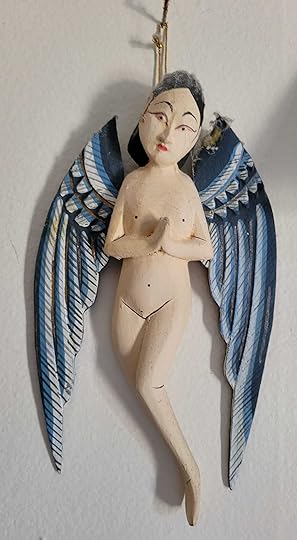 Angel. Photo: Dale Martin Smith
Angel. Photo: Dale Martin Smith Writing these notes for The Size of Paradise draws me into the open, prodding me to confront the nebulous issue of the about. I spent a year beginning in fall 2015 writing daily after work, usually in taverns, parks, or quiet nooks of my house, always in prose, listening to the environments around me. Slowly certain figures, characters, voices, images, moods, visionary states, places and devotional energies emerged. There is a Balinese Angel, for one, a small wooden figure that hangs in a corner of my room. I discovered tensions in domestic and public spaces that entered the poems through the characters of Emily Dickinson and that crowing bard, Walt Whitman. Crows, sparrows, cuckoos, and other figures of orientation returned throughout the writing to both ground and move perception. These familiar images established modes of insight and transformation, shifting as I wrote. They suggest place as variant, animated by migratory creatures, from the Carolinian Woodlands of the United States and Canada to the European song and lore of trans-Atlantic, balladic crossings—Harry Smith’s Anthology of American Folk Music (1952) is always present. Although most of the writing here generated from locations in Ontario, Texas, and Maryland, I drew on converging sources of memory, imagination, and daily news streams, devoting attention to conditions revealed in an assemblage of words. Shiloh occurred as an ongoing violence I derived from global report and commentary (the Battle of Shiloh [April 6-7, 1862] left more than 3,000 soldiers dead and many more wounded in rural Tennessee). Time seemed to stack up with images, moods, visions, and spiritual entities, recalling for me Walter Benjamin’s well-known description of Paul Klee’s Angelus Novus. In this angelic figure, Benjamin “sees one single catastrophe which keeps piling wreckage upon wreckage and hurls it in front of his feet.”
Text within this block will maintain its original spacing when publishedThere was a story. There was a time.There was a distinct sense of measure.There was a heat. But never calm. Messiness.Wide oak. How plastic lids exhale carbon.Consume the gaze. Each arm smooth and dispatched.Skull heart stands in lonely fiddler corner.One might crave honey sweetness or dareuncommon sanctimony. Oppose the darkcorner dryly. Across a runway distance,leaves of the city spangle, surprise.Sip warm cups of berry tea and lime.See tangled stems adhere to her eyes.Lean absently against the pear. Then weepin ancient doorways as people come and go.An excerpt from DALE MARTIN SMITH’s The Size of Paradise (p.9)The sonnet’s traditionally acknowledged origin in Western culture via the polyglot Sicilian court of Frederick II (1194-1250) may have been preceded in Arabic-speaking Spain by the muwashshah, a form of poetry and a musical genre. The Italian sonetto, a diminuitive of sono, a sound, tune (Latin sonum), carries over the lyric sounding (sonata) often retained in English sonnets, even those like Ted Berrigan’s or Bernadette Mayer’s that are decidedly, formally, experimental and non-standard. I restricted my sonnets to roughly ten syllables per line. I listened for what sounded out of my prose notes, and oriented my attention to the sonnet’s gravitational pull while searching for what had been latent in my writing. What does imposed form require? How does rhythm manifest meaning? I sought to establish a relationship between the raw data of perception (and reception) and the formal obligation to the song, those sounds bodying through time, across continents. I also began working with the sonnet as a way to acknowledge the teaching of Tom Clark, who showed me long ago how to listen to poetry rather than only to what I thought I might want to say.
Finally, John Milton in Book 9 of Paradise Lost illustrates a first wounding. The size of paradise might only be known by all the dead. Or we make what we can of the world by each sounding or breath. The uprising of certain order, certain careful devotions, makes possible the realities we most desire. “And the blackness says we begin a new cosmos,” writes Alice Notley. My devotional sonnets assemble little pieces moving through time and non-time, to configure what’s going on. With Notley,
I want POWer to fill this MY VOID of no size in no space
Where there is ALL of NO space I am a BROken WINDow
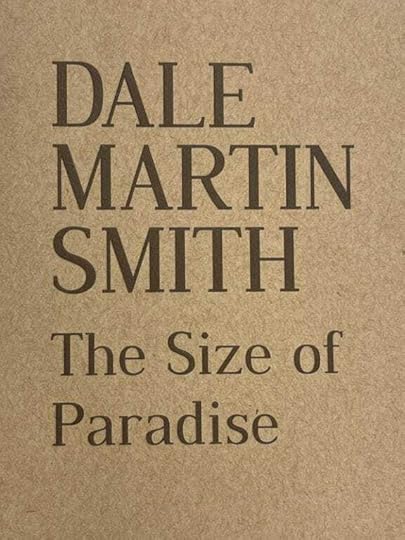 Text within this block will maintain its original spacing when published
The Size of Paradise
by Dale Martin Smithknife | fork | book, 2024Distributed by Asterism Books
Text within this block will maintain its original spacing when published
The Size of Paradise
by Dale Martin Smithknife | fork | book, 2024Distributed by Asterism BooksDale Martin Smith is a poet, editor, literary scholar, and professor at Toronto Metropolitan University. He is the author of the poetry collections The Size of Paradise, Flying Red Horse, Slow Poetry in America, Black Stone, American Rambler, as well as the Knife Fork Book chapbooks, Sons, and Blur. Born in Dallas, he earned a BA and PhD in English from the University of Texas, and an MA in Poetics from New College of California. Smith’s scholarly contributions include Poets Beyond the Barricade: Rhetoric, Citizenship, and Dissent after 1960 and two edited editions, An Open Map: The Correspondence of Robert Duncan and Charles Olson and Imagining Persons: Robert Duncan’s Lectures on Charles Olson. His essays and poetry have appeared in Poetry, The Walrus, LA Review of Books, Boston Review, and Lambda Literary. With Hoa Nguyen, he edited Skanky Possum, a literary zine and book imprint, from 1998 to 2004. His essay collection, That Tongue Be Time: Norma Cole and a Continuous Making, is forthcoming from University of New Mexico Press.Support Send My Love to Anyone
Support Send My Love to Anyone by signing up for a monthly or yearly subscription, liking this post, or sharing it
Big heartfelt thanks to all of the subscribers and contributors who make this project possible!
ConnectBluesky | Instagram | Archive | Contributors | Subscribe | About SMLTA



